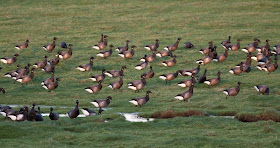Me and Alex decided to take a
New Year’s trip to Norfolk in order to catch up with all the birding goodies
that were on offer in what is surely one of the most productive of counties for birds. With a wealth of species concentrated in a small area near Kings Lynn, we had three days to connect with an impressive line-up of great birds.
Staking out Flitcham that
afternoon for the resident Pallid Harrier unfortunately drew a blank (although
we had already seen an individual last autumn in Somerset) but we were rewarded
with a beautiful flock of feeding Bramblings, a hunting Merlin and a pair of gaudy
Egyptian Geese as consolation prizes.
 |
| Phone-scoped shot of one of the Bramblings |
After eventually finding the right location and after a
fair bit of driving and scanning fields, I managed to pick out a pale coloured
Buteo heading over the ridge with pronounced black carpal patches and a white
upper tail – our target bird.
Enjoying brief views, we drove
over to the field in question and after some careful scanning, I picked up our
sought after Buzzard, this time perched in the field next to us. Taking flight
and being harassed by two persistent crows, we both got excellent views as this
majestic raptor flew along the edge of the field, the white inner tail above
distinctive along with the much paler wings and characteristic markings.
With the Rough-legged Buzzard
now out of sight and perched in a distant tree, we headed over to Cley for our
final stop of the day in an attempt to catch up with one of the four Bean Geese
that had been present on the reserve associating with the regular Pink Feet. Travelling past many farm fields, it was a
refreshing change to see coveys of both Grey and Red-legged Partridges in large numbers as we drove through Norfolk, with both species being plentiful.
Arriving at Cley, we
immediately locked on to a Barn Owl gracefully quartering the reeds in the
afternoon sun, while several Marsh Harriers patrolled the reserve. Entering the hides, the Bean Geese were
extremely difficult to pick out amongst the large flock of Pink Feet, and after
some careful scanning it wasn't until the other birders in the next hide along
pointed them out to me that I was able to pick them out. Extremely similar to
Pink Footed Geese, the good views really enabled us to note the subtle differences - their orange bills really stood out from the pink bills of the Pink Feet. Having only ever seen one Bean Goose before at Telford a few years ago,
this was a great opportunity to really get my eye in on these two confusion
species.
 |
| Two orange billed Bean Geese interspersed with the Pink Feet |
Differing from our Brent Geese by sporting a complete white neck collar and having much bolder white markings on the sides, once we had our eye in we could easily pick out this American stray amongst the hundreds of Dark-bellied Brents.
 |
| The Dark-bellied Brent Geese - Black Brant at the bottom left! |
With New Year’s Day dawning
and just one full day left, we decided to head over to Thornham Harbour where 3
Shore Larks had been present on the shingle beach next to the estuary mouth.
One of my favourite small shore birds and a species I don’t often come across
in the North West, I was keen to catch up with these delightful Bumble Bee
patterned larks.
Stopping to admire the flock of around
30 Twite that had been feeding amongst the salt marsh plants right next to the
car park and giving excellent views, we headed off in to the dunes to locate the
Shore Larks.
With an ever present stream of
New Year’s Day birders having scopes set up watching the birds, they weren't
hard to find, and we were soon enjoying close views as the three birds fed
along the tide line in the debris washed up by the waves.







No comments:
Post a Comment